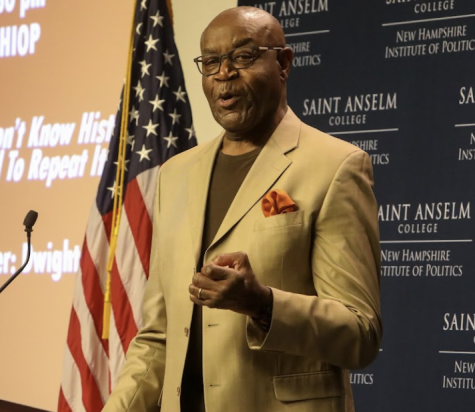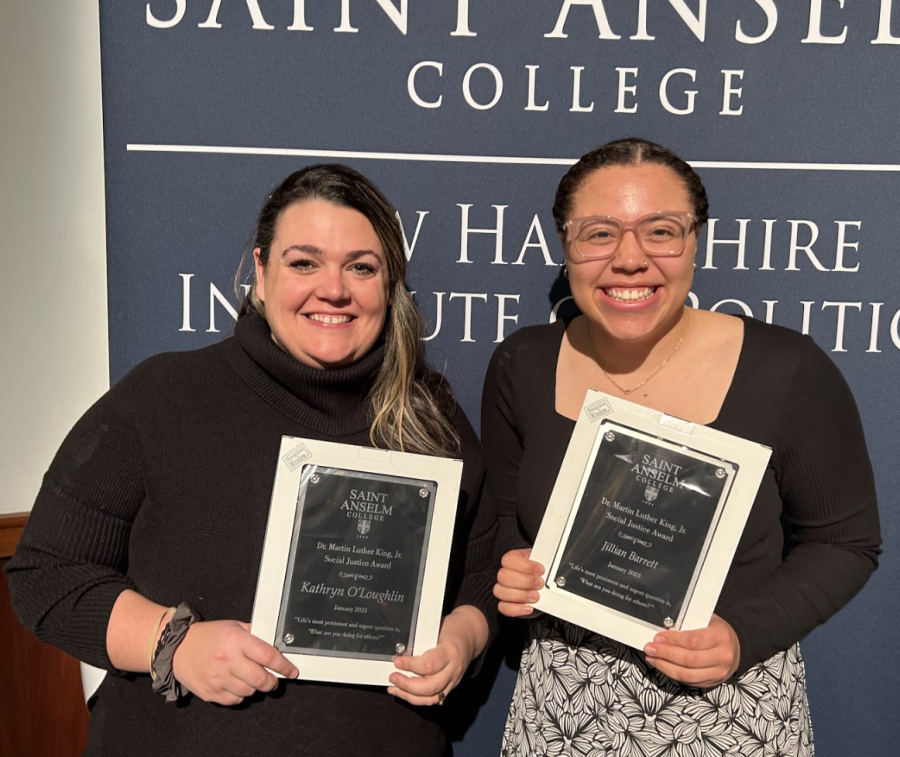‘Black history is American history’ twelve months a year
Campus Ministry director Kat O’Loughlin and Jill Barrett ‘24 were honored with Social Justice Award for their equity-oriented work on campus.
February 9, 2023
In the wake of Tyre Nichols’ murder, Saint Anselm College, like many other institutions, turns to Black History Month as a period of reflection and an opportunity for action. Guiding the college’s efforts is the theme, “Those who don’t know history are doomed to repeat it.”
Commencing the school’s observation of the month, the Intercultural Center held a dinner dedicated to the late Dr. Martin Luther King Jr.’s legacy. The dinner took place on Tuesday night at the New Hampshire Institute of Politics. There, student leaders and keynote speaker Dwight Davis spoke upon the importance of race-related conversation, and reflected upon where the country has started and where America is now.
Senior students Tarialis DeLeon, Devin Williams, and Annie Adames, led and welcomed by sophomore Brandon Potts, all spoke reciting literature reflecting the Black experience during a period of pressing oppression. Further, the Social Justice Award was presented to leaders on campus that demonstrate efforts in achieving a more equitable environment on campus. Junior Jill Barrett and Campus Ministry Director Kat O’Loughlin were recognized for their work.
Dwight Davis spoke as the Chairman of the Board for the New Hampshire Center for Justice and Equity. He connected with the audience by discussing his experiences growing up in the 60s during a period of segregation and how far the nation has progressed as a more equal society.
Wayne Currie, the Director of the Intercultural Center here on campus reflected upon the dinner itself and its purpose situated in a time of modern racism. He said that the dinner went well and explained how this dinner was the first in person since 2019.
Every year the dinner and the proceeding Martin Luther King celebration events are planned by a committee of faculty members committing to honoring King’s legacy as a collegiate institution. The theme this year was presented by Currie and accepted under the notion of its urgent relevancy.
Currie explained that the theme was rooted in the disturbing events taking place in American high schools across the nation. He highlighted the actions at River Valley High School where the school’s football team held a mock slave auction for their Black players, as well as the perturbing incident at local New Hampshire, Trinity High School, where a young student ‘prom-posed’ to a fellow student with a sign stating “If I was Black I would be picking cotton. But I’m white so I’m picking you.” Currie saw these happenings and attributed a lack of history-based education to these horrific actions.
“A lot of kids are not learning about history in high school.” Currie states, “They are doing things that they think are appropriate. These are all learned behaviors based on our environment growing up.” Currie further expressed his disappointment in adults, arguing that ignorance contributes to these actions and that adults maintain the responsibility to teach right and wrong. He explained how he would like to think that in 2022/2023 people are not thinking this way, thinking with racist intent. There is just an ignorance blanketed by a lack of education that causes actions like these to occur.
Looking forward, Currie explained how society has the responsibility to look within ourselves and decide what we are each individually doing. The conclusion of Davis’ speech was centered around Dr. King’s phrase “the arc of the moral universe is long, but it bends toward justice.” Change takes a long time, but it does happen.
Both Currie and Davis asked the audience, “what are you doing to bend the arc?” Furthering this reflective question, Currie explained that “people of color always speak up, but if white people don’t speak up then they are enabling racist behaviors.” Additionally, Currie explains how, “for years we have always focused on Black people responding, but as a society we need to encourage allies to speak up.” There is this pressing indication in the words of both Currie and Davis that it is all members of society that need to take action, not just the minority population.
Concluding with a reflection on Black History Month as a whole, Currie stated, “The underlying theme for Black History Month is that Black history is American history. Just like everything we do, every month is a celebration of something, but we can promote it all throughout the year. We can do that through our literature, including black authors. That’s a way you can honor that, however, it should be enhanced in February.”




